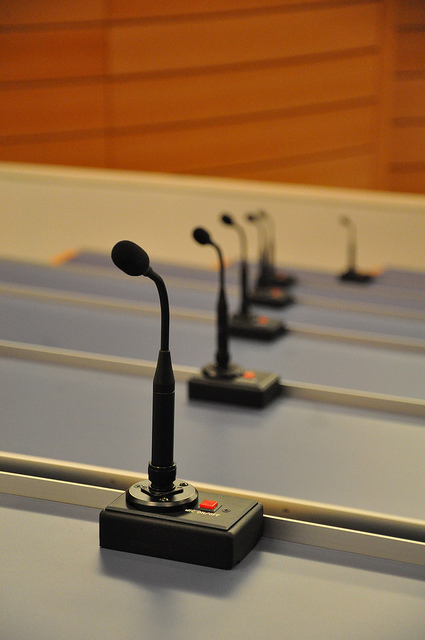 A survey of jurors from 15 trials
has found that jurors generally understand instructions not to use the
Internet or social media to research or communicate about trials, but
also that many jurors wish they could use technology to do some sort of
research about
A survey of jurors from 15 trials
has found that jurors generally understand instructions not to use the
Internet or social media to research or communicate about trials, but
also that many jurors wish they could use technology to do some sort of
research aboutCopyright 2007-24 Digital Media Law Project and respective authors. Except where otherwise noted,
content on this site is licensed under a Creative Commons Attribution-Noncommercial-ShareAlike 3.0 License: Details.
Use of this site is pursuant to our Terms of Use and Privacy Notice.
content on this site is licensed under a Creative Commons Attribution-Noncommercial-ShareAlike 3.0 License: Details.
Use of this site is pursuant to our Terms of Use and Privacy Notice.


 In 2012, a bevy of internet companies and web sites waged a successful
In 2012, a bevy of internet companies and web sites waged a successful  While the propriety of video and photography equipment in federal courts is subject of
While the propriety of video and photography equipment in federal courts is subject of  People are discovering a
People are discovering a  There was substantial media coverage of the
There was substantial media coverage of the  In August 2011,
In August 2011,  In early December, the Ninth Circuit Court of Appeals
In early December, the Ninth Circuit Court of Appeals  Juror use of the Internet to do research or communicate about trials is a growing and persistent problem. So, what can a judge do? For several years now courts have been giving jurors more detailed admonitions and jury instructions against educating themselves about cases online, to little effect.
Juror use of the Internet to do research or communicate about trials is a growing and persistent problem. So, what can a judge do? For several years now courts have been giving jurors more detailed admonitions and jury instructions against educating themselves about cases online, to little effect.
 If you're arrested, your arrest is public information: your name, your address, what you're accused of. Many news organizations publish this information on a daily basis for their communities, as part of their news coverage.
If you're arrested, your arrest is public information: your name, your address, what you're accused of. Many news organizations publish this information on a daily basis for their communities, as part of their news coverage.
 An amended bill
An amended bill A federal jury's
A federal jury's  A
A  There have several recent developments which mark a milestone in the
evolution of social media platforms: their acceptance as mainstream
forms of communication, on equal footing with older forms of
communicating official or "important" messages.
There have several recent developments which mark a milestone in the
evolution of social media platforms: their acceptance as mainstream
forms of communication, on equal footing with older forms of
communicating official or "important" messages. I've already written several posts about the overblown predictions
that a
I've already written several posts about the overblown predictions
that a  A Tulsa, Oklahoma girl and her mother
A Tulsa, Oklahoma girl and her mother 
 A federal judge's ruling that a blogger was not covered by Oregon's reporters' shield law
A federal judge's ruling that a blogger was not covered by Oregon's reporters' shield law  A doctor in New York and a dentist in Oregon have both found out that
it may not be easy to sue for libel over online reviews of their
services, after their separate lawsuits were both dismissed. And it turns out that most of the dentists and doctors who have sued over online reviews have reached similar results.
A doctor in New York and a dentist in Oregon have both found out that
it may not be easy to sue for libel over online reviews of their
services, after their separate lawsuits were both dismissed. And it turns out that most of the dentists and doctors who have sued over online reviews have reached similar results.
 The federal courts have revised the jury instructions
The federal courts have revised the jury instructions  A pending law review article -- and two of the Supreme Court's recent major decisions -- provide vivid examples that judges (and Supreme Court justices in particular) often use
"extrinsic evidence" (materials other than what the lawyers present to
them in briefs, trial, or argument) to make judicial rulings. In recent decisions, this material is often found online.
A pending law review article -- and two of the Supreme Court's recent major decisions -- provide vivid examples that judges (and Supreme Court justices in particular) often use
"extrinsic evidence" (materials other than what the lawyers present to
them in briefs, trial, or argument) to make judicial rulings. In recent decisions, this material is often found online.


